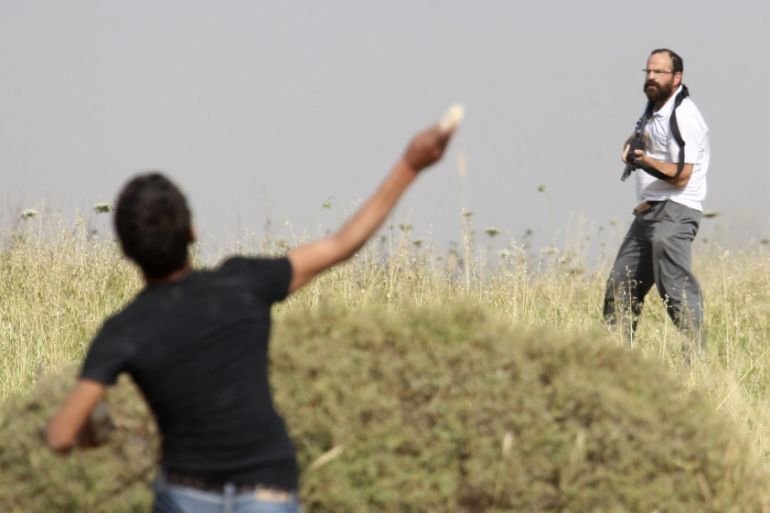Israel’s gun policy: A licence to kill Palestinians
Israelis are encouraged to carry weapons in public as restrictions on gun ownership are loosened.

Jerusalem – At a bus stop near Hebrew University in Jerusalem, a group of students cursed a looming deadline, while a couple next to them shared a cigarette. Nearby, a man dressed in shorts and flip-flops stood with a black rifle slung across his shoulder.
This has become a typical scene in Jerusalem. Guns have become more prevalent in public, as government officials encouraged Israelis to carry weapons in public.
Keep reading
list of 4 itemsIsrael’s Foreign Army
Why are thousands protesting against Netanyahu’s government in Israel?
Israel’s war on Gaza: List of key events, day 88
On October 8, about a week after anti-occupation protests broke out, Jerusalem Mayor Nir Barkat called on city residents with gun permits to carry their weapons with them in public.
Other Israeli politicians followed suit and even encouraged shooting to kill, a move criticised by human rights groups in Israel which issued a joint statement last month describing Israeli politicians’ calls to police and soldiers to shoot rather than arrest as “endorsing the killing of Palestinians”.

“It’s the gun culture of the [Israeli] military occupation crossing into Israel proper as well,” said Rela Mazali, a coordinator at Gun Free Kitchen Tables, an Israeli NGO that supports gun control.
“Under occupation for a long time, there’s been more or less impunity with the Jewish use of guns, including settlers’ use, soldiers’ use, border police, security guards, etc. We’re witnessing the privatisation of the state authorisation to commit violence. This has been ongoing for the past two decades but now it’s broadening to encourage any private citizen – who is eligible, of course – to obtain and use firearms.”
Since October 1, Israeli troops or settlers have killed at least 77 Palestinians, among them unarmed protesters, bystanders and suspected attackers.
At least 10 Israelis, including soldiers, have now been killed during the same period.
RELATED: ‘Israel is a terrorist state’
What is effectively being countenanced at the moment, without serious accountability, is shooting people to death on the streets.
According to 2013 data from the Israel’s Ministry of Public Security, 153,000 private citizens held firearms licenses, in addition to 130,000 licenses for security firms.
On October 14, the ministry loosened regulations for those applying for a firearms licence. More junior members of the armed forces were allowed to apply for a permit to purchase a gun, and civilians who had completed various security courses were also granted the right to apply.
Private security guards were given the green light to keep their weapons with them while off-duty, and the ministry even recommended that anyone with permission to carry a firearm should do so.
The application process takes around two to three months.The loosening of restrictions did not involve expediting the application process and most likely it takes longer due to increased demand.
In the days after the relaxed regulations were announced, thousands of Israelis were applying for licenses each day.
Thawra Abu Khdeir, a Palestinian journalism student at Hebrew University, said the move made her feel less safe in her city. “At the university, I see a lot of security people or soldiers who are not in uniform, carrying big guns with them,” she told Al Jazeera.
Palestinian rights groups accused Barkat and other Israeli politicians of “incitement” against Palestinians saying that Palestinians living in occupied East Jerusalem were unarmed and that Barkat was inciting against “an unarmed population living under occupation when asking civilians to carry guns and shoot us”.
OPINION: Israeli colonisation is at the root of violence
|
|
The crowd is smaller than usual at the Jerusalem night market in the west of the city, as a result of the heightened tensions. Small groups of Israelis and a few tourists stop to peruse the vintage offerings at the stalls.
Civilians outnumber the armed security forces passing by, but not by much. Matla Rivenson-Schleider, a young Israeli, noted the increased visibility of guns in the city. “It makes me feel safe, as a resident,” she told Al Jazeera.
Aryeh Levine, an American living in Jerusalem, concurred: “Every time a stabbing occurs in Jerusalem, within seconds there’s a man with a gun there, containing the situation. And that’s why I feel safer when I see a gun.”
A recent poll found out that some 53 percent of Israelis have expressed support for the extrajudicial killings of alleged Palestinian attackers on the spot, even after their arrest and when they “no longer pose a threat”.
Published by the Israel Democracy Institute, the poll’s findings reflect hardening attitudes among Jewish Israelis at a time when unrest has spread throughout Israel, the occupied West Bank, including East Jerusalem, and the Gaza Strip.
Since October, a number of Palestinian attackers or alleged attackers have been shot and killed while appearing to pose no immediate threat to life, as seen in video footage of the incidents or according to eyewitness reports.
The spate of killings has drawn condemnation from human rights groups, including Amnesty International, which has warned that extrajudicial executions appear to have taken place.
Israeli authorities have admitted that two people have been mistakenly killed in the past six weeks.
“We’ve already seen the policy of shoot-to-kill in supposed self-defence,” Mazali told Al Jazeera.
“Even if you make a mistake in identifying an attacker, even if an attacker or an alleged attacker is not directly threatening you and could have been apprehended … what is effectively being countenanced at the moment, without serious accountability, is shooting people to death on the streets.”